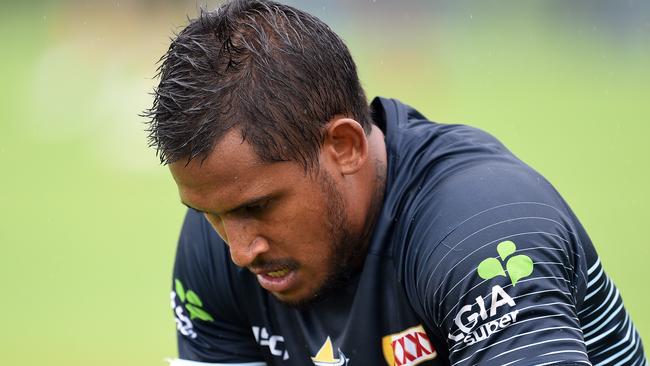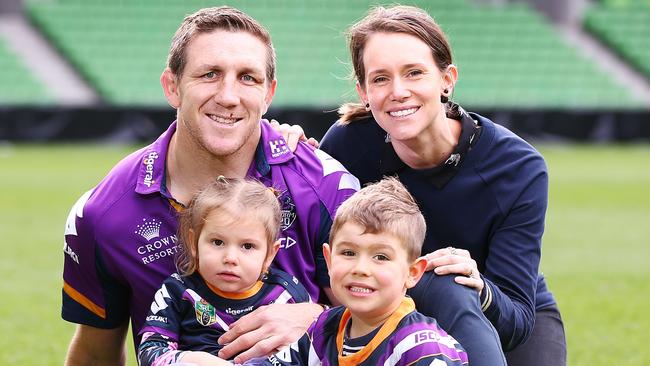Ainslie Currie is who we should be thinking of now
As the wife of a former NRL player, I’ve seen first-hand why player partners are so vulnerable when their men are kicked out or leave the game, writes Melissa Hoffman. Here’s what the NRL must do to help.
After an NRL off-season replete with player misbehaviour and serious allegations, we in the rugby league community have once again found ourselves in the murky debate as to how our game should treat proven perpetrators of violence.
Now, in the wake of domestic violence claims against Cowboys player Ben Barba, both his club and the league have acted swiftly and decisively. The Cowboys have torn up his one-year contract and the NRL have deregistered him as a professional rugby league player in Australia.
It’s an encouraging step in the right direction and if the NRL can use this decision as the groundwork for an extensive policy for dealing with allegations of domestic violence, then this precedent has the ability to act as deterrent to future would-be offenders. So it’s an integral part of the overall discussion.
MORE FROM MELISSA HOFFMAN: Stop treating footy players like they’re special
But it is only one piece of the puzzle. This is a discussion that must be continued and considerably broadened.
As a case in point: it’s been heartening to see concern for Ben Barba’s partner and children filter through the media coverage of this story.
Multiple commentators have raised concern for Ainslie Currie’s mental wellbeing as a result of the incident, and the family’s financial wellbeing following the sudden termination of a household income stream.

Like many current and former NRL partners, I know what it’s like to depend solely on a partner’s income. It’s stressful enough when it comes time to renegotiate contracts that you’ve long known are expiring; I cannot imagine what it must be like to have the rug pulled out from under you in this abrupt manner.
This is an opportunity to broaden the conversation. Not only the conversation around what we can do now for Ainslie Currie and her children, but how we can continue to improve if we face this situation again in the future.
Here’s what might seem like a disconnected example: I have long believed that NRL players should have a fixed day off. A weekday, which is selected by the club at the start of the year, and remains the same week-in, week-out, regardless of whether it’s preseason, standard competition or finals.
As it stands, NRL clubs dictate players’ week-to-week schedules within a few restrictions negotiated and set by the Rugby League Players Association. NRL clubs are not bound to provide their players (or their families) with a standard recurring day each week when they are guaranteed no commitments. They have days off, yes, but they float around and are different week-to-week.
So how would this make a real difference? It would force players to recognise that they must coexist with many other working components of a functioning society, thus going some way to negating this unreasonable expectation that players’ families will simply be “on tap” to pick up the slack of family-life and household management.
It forces players to see their families and partners as people who deserve not only their time, but some semblance of certainty in their day-to-day lives.

To simplify: there are other people in the world who need to be able to rely on you. We know people love footy, but is it so high stakes that we must be on-call seven days a week in the event of an emergency meeting about a referee crackdown on playing the ball correctly?
It also gives players a better opportunity to plan for their life after football. They could study, meet people from different backgrounds, get a small glimpse into how another section of society operates. They could use the time to commit to half a day of regular work experience — a much more appealing prospect to any employer, surely.
Crucially, a standard day off removes a huge barrier to partners of footballers with children having gainful employment.
Under the current model, given the fluidity of players’ schedules, the level of childcare required to cover all of the possible scenarios for even having a part-time job can be financially prohibitive.
Couple that with the regular travel and the fact that many families have taken contracts in cities where they have no other family support, and it’s no surprise to me that most of the partners I’ve met either don’t work, or work in the gig economy.
If we could just have one day of certainty, it would make some financial contribution or even financial independence seem that much more attainable.

And this is where it all ties together.
If players are given more realistic opportunities to work towards life after football, they’d be better equipped if football life ends abruptly, whatever the circumstances.
If partners are given time and space to earn something of a living, to create meaningful professional networks, then in these horrible situations, perhaps the financial stress at least might be somewhat alleviated.
But most importantly, if we can make big, cultural changes that communicate to everyone in the game that you must give something back to the people that support you endlessly in achieving your dreams, then perhaps it will go some way to creating an attitude shift towards partners, families and anyone outside of the rugby league sphere with regards to their intrinsic worth.
I know this might be fanciful, and I know it assumes a lot of players’ and partners’ individual choices. And there is certainly no suggestion that giving players a Tuesday off will signal the end to our problems.
But it could make a difference. It is one of many relatively simple but fundamental changes that just might go some way to contributing to a better future for our game and everyone it involves.
There are many more ideas out there, we just need to keep talking about it.
Melissa Hoffman is a freelance writer and the wife of former Melbourne Storm player Ryan Hoffman.


